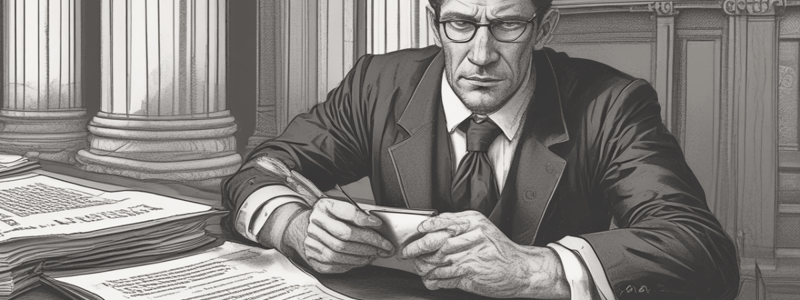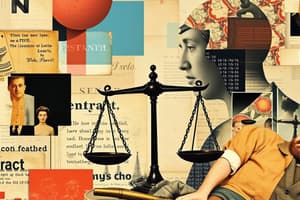Podcast
Questions and Answers
Unilateral mistake as to ______ can be relieved if the other party knows of the mistake.
Unilateral mistake as to ______ can be relieved if the other party knows of the mistake.
terms
A mistake as to ______ may render the contract void if impossible to fulfill.
A mistake as to ______ may render the contract void if impossible to fulfill.
terms
A contract is discharged if the circumstances become ______ different.
A contract is discharged if the circumstances become ______ different.
radically
A unilateral mistake is when one party to the ______ is mistaken.
A unilateral mistake is when one party to the ______ is mistaken.
If the other party knows that the mistaken party is mistaken, it is a ______ unilateral mistake.
If the other party knows that the mistaken party is mistaken, it is a ______ unilateral mistake.
The conventional rule is that a known unilateral mistake as to the ______ of the contract prevents agreement.
The conventional rule is that a known unilateral mistake as to the ______ of the contract prevents agreement.
If a party makes a mistake as to ______ other than the terms of the contract, there is no relief.
If a party makes a mistake as to ______ other than the terms of the contract, there is no relief.
The rule that applies when a party makes a mistake as to matters other than the terms of the contract is ______ emptor.
The rule that applies when a party makes a mistake as to matters other than the terms of the contract is ______ emptor.
A mistake as to ______ may make the contract void if it is fundamental.
A mistake as to ______ may make the contract void if it is fundamental.
Relief for erroneous assumptions in the law of ______ and frustration is fairly limited.
Relief for erroneous assumptions in the law of ______ and frustration is fairly limited.
Relief is induced by a mistake or ______.
Relief is induced by a mistake or ______.
In the case of Smith v Hughes, the buyer has full opportunity of ______ and forming his own judgement.
In the case of Smith v Hughes, the buyer has full opportunity of ______ and forming his own judgement.
The rule ______ applies when the buyer chooses to act on his own judgement.
The rule ______ applies when the buyer chooses to act on his own judgement.
In the case of Digilandmall, the unilateral mistake was known as to the ______ of the contract.
In the case of Digilandmall, the unilateral mistake was known as to the ______ of the contract.
The test for common mistake is whether the mistake was so ______ as to render the expected contractual performance 'essentially different' or 'impossible'.
The test for common mistake is whether the mistake was so ______ as to render the expected contractual performance 'essentially different' or 'impossible'.
A common mistake will render the contract ______ as if there was never a contract.
A common mistake will render the contract ______ as if there was never a contract.
The party invoking common mistake cannot be at ______.
The party invoking common mistake cannot be at ______.
The doctrine of frustration only applies if the contract contains no provision that covers the ______.
The doctrine of frustration only applies if the contract contains no provision that covers the ______.
The case of The Great Peace involves identifying what the parties agreed would be ______.
The case of The Great Peace involves identifying what the parties agreed would be ______.
The Basis for the judgement in The Peerless is that cross-purposes mistakes may result in no ______.
The Basis for the judgement in The Peerless is that cross-purposes mistakes may result in no ______.
A mistake as to terms is a lack of agreement or no meeting of the ______ of the minds
A mistake as to terms is a lack of agreement or no meeting of the ______ of the minds
The effect of mistake is that the contract is ______
The effect of mistake is that the contract is ______
Frustration occurs when a supervening event undermines the parties' assumptions ______ contract formation
Frustration occurs when a supervening event undermines the parties' assumptions ______ contract formation
The test for frustration is that the contractual obligation has become ______ different from that which was undertaken
The test for frustration is that the contractual obligation has become ______ different from that which was undertaken
The effect of frustration is the ______ of the contract from the point of the supervening event
The effect of frustration is the ______ of the contract from the point of the supervening event
The Law Reform (Frustrated Contracts) Act 1943 allows for the recovery of money already paid under the contract, but the court may set off the ______ expenses to the extent this is 'just'
The Law Reform (Frustrated Contracts) Act 1943 allows for the recovery of money already paid under the contract, but the court may set off the ______ expenses to the extent this is 'just'
The aim of the Law Reform (Frustrated Contracts) Act 1943 is to do ______ on the facts of the case
The aim of the Law Reform (Frustrated Contracts) Act 1943 is to do ______ on the facts of the case
The frustrating event must take place without ______ or fault on either side of the party
The frustrating event must take place without ______ or fault on either side of the party
In Taylor v Caldwell, the subject matter of the contract, a concert hall, was destroyed by ______
In Taylor v Caldwell, the subject matter of the contract, a concert hall, was destroyed by ______
In contracts in which the performance depends on the continued existence of a given person or thing, a condition is implied that the impossibility of performance arising from the ______ of the person or thing shall excuse the performance
In contracts in which the performance depends on the continued existence of a given person or thing, a condition is implied that the impossibility of performance arising from the ______ of the person or thing shall excuse the performance
Flashcards are hidden until you start studying
Study Notes
Mistake and Frustration
- Mistake is a false assumption at the time of contract formation.
Unilateral Mistake
- Occurs when one party to the contract is mistaken.
- Relief is possible if the other party knows of the mistake.
- Known unilateral mistake as to terms of the contract prevents agreement (Smith v Hughes).
- Unknown unilateral mistake concerning terms of the contract: no relief.
- Mistaken assumption: no relief, even if other party knows (Smith v Hughes).
Common Mistake
- Both parties make the same mistaken assumption.
- Test: Was the mistake so fundamental as to render the expected contractual performance 'essentially different' or 'impossible' (The Great Peace)?
- Effect: contract is rendered 'void' as if there was never a contract.
- No relief for common mistake if terms of the contract govern the eventuality.
Cross-purposes Mistake
- Both parties are mistaken, but in different ways.
- May result in no contract (The Peerless).
- Basis for the judgment: mistake as to terms = lack of agreement / no meeting of the minds.
- Mistaken assumption = akin to common mistake.
Frustration
- Occurs after contract formation, a supervening event undermines the parties' assumptions.
- Test: radically different (Davis Contractors v UDC).
- Effect: discharge of contract from the point of supervening event; parties are no longer required to perform their contractual obligations.
- Law Reform (Frustrated Contracts) Act 1943: recovery of money paid and value of benefits conferred.
Cases
- Smith v Hughes: unilateral mistaken assumption; no relief even if other party knows.
- The Great Peace: test for common mistake; contract is rendered 'void'.
- Taylor v Caldwell: frustrating event; subject matter of contract is destroyed.
- Canary Wharf v European Medicines Agency: rationales for frustration doctrine.
- BP v Hunt: just is what the trial judge thinks is just (unless plainly wrong).
Studying That Suits You
Use AI to generate personalized quizzes and flashcards to suit your learning preferences.




